A parakeet needs to hear lots of human speech if he's ever going to talk (and we use ‘he’ because it is usually the male birds that learn to talk). The bird will have more chance of learning if he’s been finger-trained first. At this point he’ll be very comfortable in your presence, and will eagerly listen to everything you have to say.
Some parakeets seem to prefer voices in a higher register - i.e. women and children rather than men. If you’re a male, and you’re the only one teaching the parakeet, try using the top end of your range!
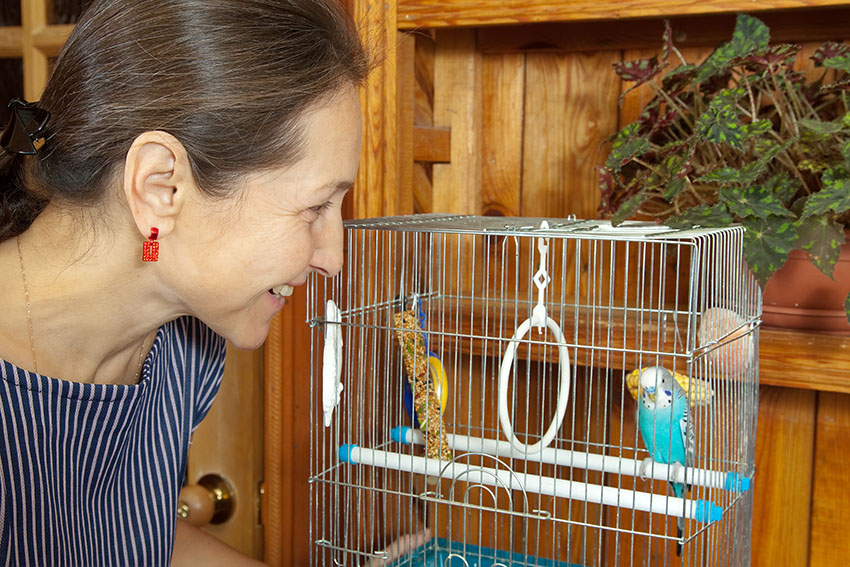
Parakeets like the sound of female voices
Tips for Getting Parakeets to Talk
- Your parakeet will need to be happy in his surroundings before you can start teaching him; although a general background of human voices will always be useful, even in the first few days after bringing the pet home. Watch your bird to check out his mood – when he’s sitting on the perch, slightly fluffed up, chattering busily to himself, it means he’s in a receptive mood for talking.
- Mornings are a good time for a quick talking lesson; or in the evening when he’s had some food and is settling in for a good chatter before bedtime.
- You will need to repeat your chosen words many times, with your face close to the cage. The parakeet will watch you as you speak, and his might dilate as you speak. That’s a good sign, and it means he finds the sounds stimulating.
- The parakeet’s name is the best starting point. You can then use it in phrases such as “Hello Mango!” and “Mango’s a good boy!” (replacing ‘Mango’ with your pet’s actual name, of course!)
- Training sessions should last no more than to 10 or 15 minutes, with one in the morning and one in the evening. You can throw in a quick “Hello mango!” whenever you pass the cage, of course.
- During the focused training sessions, limit other sounds and distractions in the room.
- When teaching, repeat the words you’re teaching, but find time for a proper chat with the parakeet too, returning to the core phrases regularly.
- Keep the training sessions interesting, repeating the words with feeling rather than in a monotone. Parakeets will respond to a lively voice more than a monotone or whisper. But don’t shout, because that will only scare the bird.
- Talk to the parakeet whenever you interact with him, with phrases like “good morning” and “good night”, and lots of hellos at other times. When replenishing the seed tray, say something like “Where’s your food?”, and say things like “Good boy!” when he hops onto your finger. Keep talking, and he will soon come to associate sounds with the various activities and times of day.
- As soon as your parakeet makes speaks some words, repeat them back.
- Once the bird has mastered a word or phrase, concentrate on the next one. It takes him time for a parakeet to build a repertoire of words, so be patient.
- The parakeet can be rewarded with a favourite treat the first few times he says his first words, as encouragement. But don’t make this a habit as time goes on, or the bird will talk simply to get the treat, and will then squawk angrily, rather than talk, if it fails to appear!
- Avoid showing impatience or anger, whether in word or gesture – that will make the parakeet associate the lessons with something unpleasant, and will certainly not encourage his talking skills.
Advanced Parakeet Talking Training
Going beyond a few words and phrases is for committed trainers only, as it takes time. The next level involves getting the parakeet to associate certain sounds with certain situations and moods.
Start by naming all the things your parakeet interacts with – toys, perches, items of food. Introduce people as they enter the room, and comment on everything. Play some favorite songs, joining in with the words. If the bird has a natural instinct for mimicry, some of this will sink in.
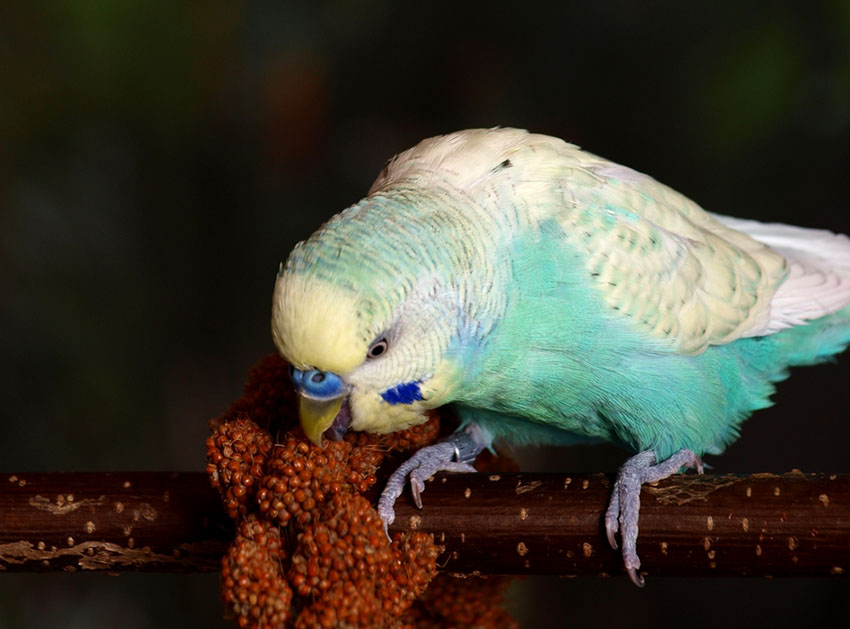
A la carte vocabulary – some parakeets can learn to name items of food
This level of teaching relies on the fact that the budgerigar is a very intelligent bird. Using sound to express mood is all part of the bird’s biological wiring.
Here are some tips for expressing emotion with your parakeet, and responding to his mood in words:
- Affection: when your parakeet is preening or chilling, say something like “Mango’s a beautiful bird!”. Do this if his affection is aimed at you, too, while he’s perched on you.
- Anger: Try saying things like “Mango is so angry!” during a parakeet tantrum, using a slightly sharper tone of voice than usual. A really clever bird may take on the phrase and even use it when he’s feeling angry in future.
- Pleasure: if your parakeet is sitting and twittering quietly, or “grinding” his beak, it’s a sign that he’s chilling out. Say things such as “Mango is so happy!” or “What a lovely song!”. A clever bird may come to associate the phrases with the good mood, and it’s fantastic when your parakeet first says repeats these things as he chills.
- Fear: holding the feathers close to the body, uttering a distressed chirrup!, rapid breathing, wildly flapping on the sides or floor of the cage, or a frozen-but-ready-to-fly stance, are all indications of fear. Try saying “Mango is scared!” or something similar. If your parakeet learns to repeat these phrases when he’s scared, it’s a very touching moment – and very useful too, as he will be telling you, in words, that something is not right.
- Grief: this isn’t something most parakeets express; but some birds display grief-related behavior if a friend or chick has died. A sad parakeet will hop around the cage looking for the missing bird, or he may be quieter or more listless than usual (but be aware that a quiet or inactive parakeet is more likely to be ill than mourning). Use phrases like “Mango is very sad!” This can also be applied to times when your bird is actually ill; although in these circumstances he should be taken to a vet as soon as possible, rather than being taught to say how ill he is!
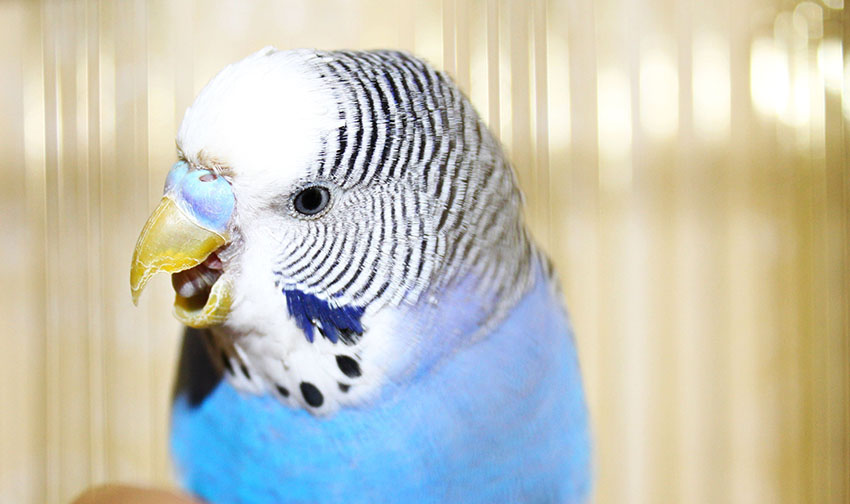
Parakeet anger management
Not many birds become super-talkers, and many simply take the new words and phrases and mash them into a parakeet gobbledegook! But some birds seem to ‘get it’, and if you have one of these, you’re a very lucky owner indeed. It’s pretty mind-blowing when parakeets reach the stage where they can actually tell you things. But, we have to emphasize, it’s very rare!


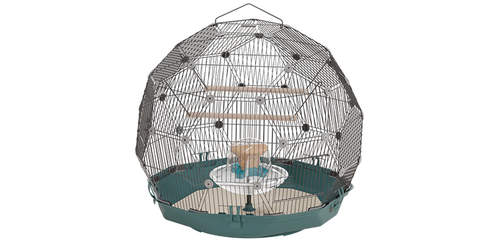
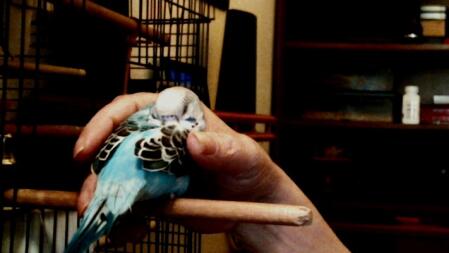
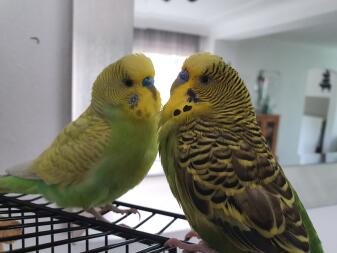
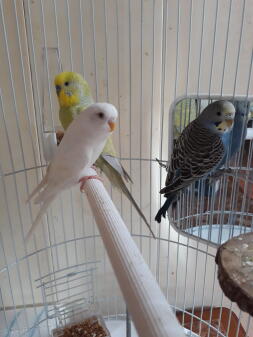
Comments
Daphne, 9 July 2024
My husband and I just added four Budgies to our flock two days ago. The other five are various other Parrots. We've never had any Budgie's so this is new to us. I always read everything I can about a new bird when I am not familiar with it and that's how I ended up here. Thank you for teaching me some things I didn't know! Great information!
Terry, 24 May 2021
I think I'm one of the lucky ones.... I've owned keets for several years, and taught them a few words and whistles. Now I'm retired & semi-quarantined and have lots of time to dedicate to their training. Long story short, I adopted JoJo (M) in Feb., directly from the breeder at 7 weeks old. I knew immediately he was special. It's mid-May know, and he already knows whistles to express 'jump on finger' and 'preen/affection', his name (and knows it's his name), and has just learned 'Dirty Bird'. Your advice in this article is priceless, I can't thank you enough!
Margaret, 27 July 2020
Love reading all your tips on raising budgies. Thank you!